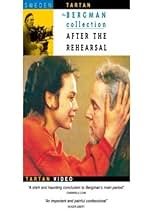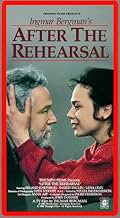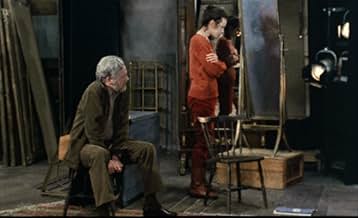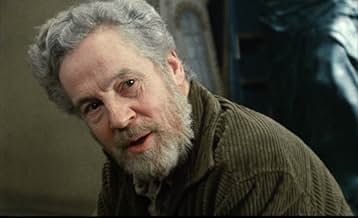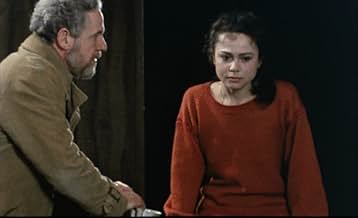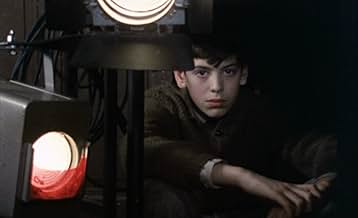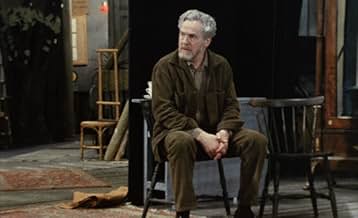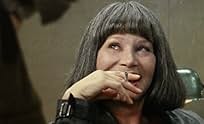NOTE IMDb
7,1/10
3,1 k
MA NOTE
Ajouter une intrigue dans votre langueAs an aging playwright interacts with the young lead in his play after everybody's gone home, he reminisces about her mother, whom he maintained a sexual relationship with before she died.As an aging playwright interacts with the young lead in his play after everybody's gone home, he reminisces about her mother, whom he maintained a sexual relationship with before she died.As an aging playwright interacts with the young lead in his play after everybody's gone home, he reminisces about her mother, whom he maintained a sexual relationship with before she died.
- Réalisation
- Scénario
- Casting principal
- Récompenses
- 2 nominations au total
Avis à la une
10agboone7
I've always said that I could never choose a favorite filmmaker, but that if I had to, it would be Ingmar Bergman, for certain. A bit of a contradiction, I admit, but there you have it. For me, he is the grandmaster of the cinema. I've seen exactly forty of his films, and "After the Rehearsal" may be the greatest of them all.
Of course, that depends very much on your tastes. We see here a very different Bergman from the one many viewers are accustomed to. There are, after all, two Ingmar Bergmans: First, we have Bergman the magician, the cinematic sorcerer who made films like "The Seventh Seal" and "Persona". Secondly, we have Bergman the realist, emerging during the latter period of his career, with films like "Scenes From a Marriage" and "Autumn Sonata". These films aren't quite realism, of course — they're still very formal — but they're certainly very stripped-down and minimalistic by comparison.
"After the Rehearsal" is probably the most extreme example of this latter category of Bergman's cinema. It is a minimalist exercise in what is essentially filmed theater. As a result, those looking for the kind of cinematic wizardry that Bergman displayed in so many of his films up through the '60s (and which he revived for "Fanny and Alexander" in 1982) may be a bit disappointed by this film, strictly in aesthetic and stylistic terms. Nyqvist's cinematography is absolutely masterful, as always, but it's masterful in the same way it was in "Scenes From a Marriage" — unrelenting close-ups of the frail human condition, et cetera — versus the kind of technical and formal mastery he displayed in "Fanny and Alexander" or Tarkovsky's "The Sacrifice". This is a low-budget, theatrical production, so don't expect a grand tour de force of Bergmanian cinema.
On the other hand, when it comes to content, that's exactly what "After the Rehearsal" is. It offers the most insightful, profound exposition yet of Bergman's identity, essence, and point of view as an artist, as a filmmaker (and as a theater director), and perhaps most notably, as a human being. Every line, every word, every expression, every intonation, every gesture is a revelation of the most meaningful variety, for those who are familiar with Bergman and his way of expressing ideas. Never before has Bergman condensed so much thought, so many ideas and themes, into one film (and quite a short one at that). This is a concentrated exercise in subtextual expression, and on that note, I have two caveats to issue to those considering watching this film.
First, as we know, most audiences today don't like to be provoked toward thought, analysis, or self-reflection, so if you're turned off by the idea of watching two people talk for seventy minutes straight, save yourself the effort and skip this one. "After the Rehearsal", even more than normal for a Bergman film, requires the ability to think in thematic, subtextual, and metaphorical terms. Even for the most avid Bergman fans, and even by the strictest Bergman standards, this film requires patience and thorough analysis.
Secondly, I'm a firm believer in experiencing a filmmaker's body of work chronologically. I know many viewers don't share this compulsion, but I must stress that it is crucial for this film. "After the Rehearsal" is a deep and painstaking reflection on everything Bergman has ever done and everything he has ever been during the course of his long and illustrious career. If you haven't seen the vast majority of Bergman's previous work, this film will be impossible to fully appreciate.
Virtually all of Bergman's recurring themes are present in "After the Rehearsal", such as the idea of human beings as actors in this often shoddy, second-rate production that we call life. Bergman's characters engage in emotional dialogue or intensive introspection, and then, hearing the words come out of their mouths, they experience shame and mortification as a result of what they perceive to be their own playacting and histrionics, and so they subsequently backpedal over their previous statements with a tone of fatigue and despair. It's not just Bergman's characters, however, that exhibit this behavior. Bergman himself does it, from film to film. The first time we saw it was in "Prison" (1949), his sixth film, when he criticized himself in a moment of self-reference that cited a scene from "It Rains on Our Love" (I believe). Since then, and especially in his later work, it's been a constant for Bergman, although much more subtle and less explicit than it was in "Prison". In a way, it provides a metaphor for what Bergman does with "After the Rehearsal".
"Fanny and Alexander" is considered Bergman's swan song, and I suppose it is. He officially retired from cinema afterwards, and everything he directed since then, with the exception of "The Making of Fanny and Alexander", was a television film, including "After the Rehearsal", in which Bergman makes one last attempt to clarify himself, to backpedal on a career of directing films and plays, and to explain what it all meant, and what he has become in light of it.
"After the Rehearsal" is a highly self-reflexive, metatextual meditation on what it means to be a director. The power, the manipulation, the messy emotions and relationships with actors who often confuse the role they play in a film (or play) with the role they play in life. The two roles begin to converge, and at the helm of it all, there is Bergman, a man who is slowly but surely distancing himself from the world around him. The world of cinema. The world of theater. The world of life.
Ultimately, that's what "After the Rehearsal" is about. It's Bergman's explanation and exploration of the reasons why he has chosen to distance himself from the world of filmmaking, and it's brilliant for every moment of its 72 minutes.
RATING: 9.67 out of 10 stars
Of course, that depends very much on your tastes. We see here a very different Bergman from the one many viewers are accustomed to. There are, after all, two Ingmar Bergmans: First, we have Bergman the magician, the cinematic sorcerer who made films like "The Seventh Seal" and "Persona". Secondly, we have Bergman the realist, emerging during the latter period of his career, with films like "Scenes From a Marriage" and "Autumn Sonata". These films aren't quite realism, of course — they're still very formal — but they're certainly very stripped-down and minimalistic by comparison.
"After the Rehearsal" is probably the most extreme example of this latter category of Bergman's cinema. It is a minimalist exercise in what is essentially filmed theater. As a result, those looking for the kind of cinematic wizardry that Bergman displayed in so many of his films up through the '60s (and which he revived for "Fanny and Alexander" in 1982) may be a bit disappointed by this film, strictly in aesthetic and stylistic terms. Nyqvist's cinematography is absolutely masterful, as always, but it's masterful in the same way it was in "Scenes From a Marriage" — unrelenting close-ups of the frail human condition, et cetera — versus the kind of technical and formal mastery he displayed in "Fanny and Alexander" or Tarkovsky's "The Sacrifice". This is a low-budget, theatrical production, so don't expect a grand tour de force of Bergmanian cinema.
On the other hand, when it comes to content, that's exactly what "After the Rehearsal" is. It offers the most insightful, profound exposition yet of Bergman's identity, essence, and point of view as an artist, as a filmmaker (and as a theater director), and perhaps most notably, as a human being. Every line, every word, every expression, every intonation, every gesture is a revelation of the most meaningful variety, for those who are familiar with Bergman and his way of expressing ideas. Never before has Bergman condensed so much thought, so many ideas and themes, into one film (and quite a short one at that). This is a concentrated exercise in subtextual expression, and on that note, I have two caveats to issue to those considering watching this film.
First, as we know, most audiences today don't like to be provoked toward thought, analysis, or self-reflection, so if you're turned off by the idea of watching two people talk for seventy minutes straight, save yourself the effort and skip this one. "After the Rehearsal", even more than normal for a Bergman film, requires the ability to think in thematic, subtextual, and metaphorical terms. Even for the most avid Bergman fans, and even by the strictest Bergman standards, this film requires patience and thorough analysis.
Secondly, I'm a firm believer in experiencing a filmmaker's body of work chronologically. I know many viewers don't share this compulsion, but I must stress that it is crucial for this film. "After the Rehearsal" is a deep and painstaking reflection on everything Bergman has ever done and everything he has ever been during the course of his long and illustrious career. If you haven't seen the vast majority of Bergman's previous work, this film will be impossible to fully appreciate.
Virtually all of Bergman's recurring themes are present in "After the Rehearsal", such as the idea of human beings as actors in this often shoddy, second-rate production that we call life. Bergman's characters engage in emotional dialogue or intensive introspection, and then, hearing the words come out of their mouths, they experience shame and mortification as a result of what they perceive to be their own playacting and histrionics, and so they subsequently backpedal over their previous statements with a tone of fatigue and despair. It's not just Bergman's characters, however, that exhibit this behavior. Bergman himself does it, from film to film. The first time we saw it was in "Prison" (1949), his sixth film, when he criticized himself in a moment of self-reference that cited a scene from "It Rains on Our Love" (I believe). Since then, and especially in his later work, it's been a constant for Bergman, although much more subtle and less explicit than it was in "Prison". In a way, it provides a metaphor for what Bergman does with "After the Rehearsal".
"Fanny and Alexander" is considered Bergman's swan song, and I suppose it is. He officially retired from cinema afterwards, and everything he directed since then, with the exception of "The Making of Fanny and Alexander", was a television film, including "After the Rehearsal", in which Bergman makes one last attempt to clarify himself, to backpedal on a career of directing films and plays, and to explain what it all meant, and what he has become in light of it.
"After the Rehearsal" is a highly self-reflexive, metatextual meditation on what it means to be a director. The power, the manipulation, the messy emotions and relationships with actors who often confuse the role they play in a film (or play) with the role they play in life. The two roles begin to converge, and at the helm of it all, there is Bergman, a man who is slowly but surely distancing himself from the world around him. The world of cinema. The world of theater. The world of life.
Ultimately, that's what "After the Rehearsal" is about. It's Bergman's explanation and exploration of the reasons why he has chosen to distance himself from the world of filmmaking, and it's brilliant for every moment of its 72 minutes.
RATING: 9.67 out of 10 stars
This is a brilliant work of art - it manages to be both an outstanding piece of theatre captured on film and an equally engaging film about theatre. There is no plot in a conventional sense, and absolutely no action. Instead, Erland Josephson, utterly convincing in his role as an aging theatre director, quietly and with ruthless honesty interacts with both his current new star and an actress from his personal and professional past. During this interplay, the director on the screen (speaking for the director behind the camera?) explains his love for actors and the theatre, while simultaneously modeling and undermining the sense of alienation that he feels he needs to have in order to get his job done in this world that he loves. At the same time, his young star examines her reasons for acting, and the woman from his past presents yet another take on the function of theatricality.
The dialogue is, as always with Bergman, perfect; the film is saturated with ideas; and the simple stage where every moment of the film takes place works in two directions at once, reminding us that we are watching a performance even while it insists we are also seeing "real" people at work.
Bergman is always amazing in his ability to express, in films that are set in singular specific locations, deep emotions and concepts that are nonetheless universal - in this film he gives us a little bonus, an insight into the motives behind manufacture of representation itself.
The dialogue is, as always with Bergman, perfect; the film is saturated with ideas; and the simple stage where every moment of the film takes place works in two directions at once, reminding us that we are watching a performance even while it insists we are also seeing "real" people at work.
Bergman is always amazing in his ability to express, in films that are set in singular specific locations, deep emotions and concepts that are nonetheless universal - in this film he gives us a little bonus, an insight into the motives behind manufacture of representation itself.
Fanny and Alexander, to Ingmar Bergman, IS his last released film, written and directed by him. But this film, which was originally meant only for Swedish television, found its way to the USA and abroad, and (excluding Saraband, which was a film that just had to be made by its maker) is a welcome piece of theater, about the theater. After the Rehearsal is a short, but extremely satisfying take on what it means to be a director, and what it means to act, or to just be in the profession of the imitation of life. Bergman gives us only three actors (two kids, who pop up only for a few moments, one of which the child who wonderfully played Alexander in the above title, is one of them), and all that happens is talk, and talk.
To one who may not be familiar well with Bergman, it may not be wise to go immediately to this film. That is, unless one is very much in love with the theater. The filmmaker, who was also a major producer and director of countless theatrical production, is able to suffuse his personal views, good and bad, on the process, or the lack thereof. Interesting too is how his lead male, Henrik (Erland Josephsson, one of Bergman's most recognizable and accessible talents), has a conversation not just with an aspiring actress (Lena Olin), but also his ex-wife (Ingrid Thulin, also one of the magnificent women from Bergman's repertory company), to explore his past and present difficulties.
There is so much that Bergman brings to the table to discuss about the theater in this film, and in such a short running time, that it might be moot to delve very far into his what certain things may or may not 'mean'. Like many of the director's films, it's dramatic structure that tries to get behind the surfaces of what lies in seemingly one or two-sided characters. Henrik, at times, is given voice-over narration where he questions what he's saying, sometimes in anger or despair, to this young actress. Or, when his love (Thulin) is shown to be somewhat compassionate even as she seems a little crazed or, in fact, lonely. As Henrik and his pupil talk (not rehearse, of course) about why they are there, it becomes strikingly existential even when it's not meant to be. Olin is brilliant in the opposing side of Josephsson's often calm but boiling persona, as she tries to figure out what it is this director wants out of her.
When it comes down to it, Bergman is not only asking questions about the theater and the people in it, but also about human nature in its role of the theater. While this could sound like subject matter to scare or (worse) bore away some viewers, if you give the film enough patience for the 72 minutes (that seem to fill each minute with enough substance for an average work twice its length), it serves its purpose well enough to not be disregarded as an important later work in Bergman's career. And, by the way, if you're young (i.e. under 17) and have some reason to want to check this out, don't let the R rating deter you; it's one of the most un-necessarily R-rated films ever (for a brief flash of nudity, which could very well even be given a PG rating). A+
To one who may not be familiar well with Bergman, it may not be wise to go immediately to this film. That is, unless one is very much in love with the theater. The filmmaker, who was also a major producer and director of countless theatrical production, is able to suffuse his personal views, good and bad, on the process, or the lack thereof. Interesting too is how his lead male, Henrik (Erland Josephsson, one of Bergman's most recognizable and accessible talents), has a conversation not just with an aspiring actress (Lena Olin), but also his ex-wife (Ingrid Thulin, also one of the magnificent women from Bergman's repertory company), to explore his past and present difficulties.
There is so much that Bergman brings to the table to discuss about the theater in this film, and in such a short running time, that it might be moot to delve very far into his what certain things may or may not 'mean'. Like many of the director's films, it's dramatic structure that tries to get behind the surfaces of what lies in seemingly one or two-sided characters. Henrik, at times, is given voice-over narration where he questions what he's saying, sometimes in anger or despair, to this young actress. Or, when his love (Thulin) is shown to be somewhat compassionate even as she seems a little crazed or, in fact, lonely. As Henrik and his pupil talk (not rehearse, of course) about why they are there, it becomes strikingly existential even when it's not meant to be. Olin is brilliant in the opposing side of Josephsson's often calm but boiling persona, as she tries to figure out what it is this director wants out of her.
When it comes down to it, Bergman is not only asking questions about the theater and the people in it, but also about human nature in its role of the theater. While this could sound like subject matter to scare or (worse) bore away some viewers, if you give the film enough patience for the 72 minutes (that seem to fill each minute with enough substance for an average work twice its length), it serves its purpose well enough to not be disregarded as an important later work in Bergman's career. And, by the way, if you're young (i.e. under 17) and have some reason to want to check this out, don't let the R rating deter you; it's one of the most un-necessarily R-rated films ever (for a brief flash of nudity, which could very well even be given a PG rating). A+
Here's a bit of an odd confession. I'm starting to like this Ingmar Bergman guy. Mind you, I've only seen two of his films (the other being Cries and Whispers) but he knows how to make a film, let me tell ya! After the Rehearsal is a great movie that makes you think, while marveling how clever the whole thing is. A theater director (played by Erland Josephson) is putting together a production called "The Dream Play". One of his actresses (Lena Olin) stays behind to talk to him about past experiences, his life and hers, and other existential topics. He does the same. A little while later an older actress comes on the scene, and essentially talks the same talk, only a little older but definitely not wiser. The interesting thing about this is, is that both women don't acknowledge the other.. So what's that about? Was this the same woman, only years later? Did these women exist at all, or are we indeed watching a "dream play" already? So many fascinating theories, I love it when a movie does that to me. The movie somewhat lags during the third act, but let me tell you, Bergman KNOWS how to end movies, like in Cries and Whispers and this one, it leaves some questions unanswered for us to figure out by ourselves, and Bergman seems to rejoice yanking us away from the story to go to the credits, which is great.
I want to see more! I will see more! Yay!
I want to see more! I will see more! Yay!
Here's an interesting little movie with a cast of three, set entirely on a stage, and that jumps backwards and forwards in time.
Henrik is a theater director spending some time alone on the stage after a rehearsal of A Dream Play by August Strindberg. He wants to collect himself before he returns to his domicile to take a nap prior to that night's rehearsal. As he sits there, one of his actresses, Anna, arrives on stage with a thin story of looking for a bracelet. What follows is a long conversation between the two that swirls around topics as it operates as some kind of seduction, direction, and exploration of the other.
About a third of the way through, something happens that is quite jarring at first. Another woman shows up on stage. This is Rakel, Anna's mother who has been dead for ten years. Anna sits on the couch watching the scene without moving or speaking, and we soon deduce that Henrik is playing out a conversation he had had with Rakel eleven years before, just prior to her death.
Rakel was a great actress in her day. She played the same role Anna is playing to great acclaim, but she had Anna and quit acting. At the time of the conversation, she's living in a hospital and the small role she's playing (the mother) is almost an act of pity on the part of Henrik. He used to love her, but she spurned his affections before. However, in this conversation, she throws herself at him, and Henrik cannot stand it. He eventually makes an empty promise to follow her to her room, but we get the impression that there's going to be no encounter.
The conversation returns to Anna as Henrik takes up the exact same position he had been in when Rakel had walked on, implying that what we had seen was just a memory that had passed in a flash. In this final third of the film, souls are bared and dark revelations of Anna's recent past come out. There are protestations of love and hate. It's a swirl of emotions that's surprisingly effective.
The movie ends when the camera suddenly cuts to a new view we haven't seen before. The movie has almost entirely shot with cameras from the audience pit, but the final shot is to the stage from the side. We see a giant brick wall and the director and young actress small against it. The conversation even changes tenor becoming more professional in nature than emotional. Something's drastically changed.
Early in the movie, Henrik talks about how he's willing to do anything to work with actors (whom he loves) in order to help them reach their potential. He looks like he's playing in their field, but he's never really involved. So, at that final shot, those words came back to me, and I asked, "Was it all an act?" Were the high emotions and swings all about directing his actor?
It's an interesting exploration of the relationship between directors and actors, something obviously intimately familiar to Bergman. Watching the movie, it became obvious how Bergman could strike up so many affairs with so many of his actresses, and, at the same time, how they could all fall apart in the end. Still, the movie is a little insular to acting specifically which limits its broad appeal. It's a good little movie, a fascinating little footnote in Bergman's career.
Henrik is a theater director spending some time alone on the stage after a rehearsal of A Dream Play by August Strindberg. He wants to collect himself before he returns to his domicile to take a nap prior to that night's rehearsal. As he sits there, one of his actresses, Anna, arrives on stage with a thin story of looking for a bracelet. What follows is a long conversation between the two that swirls around topics as it operates as some kind of seduction, direction, and exploration of the other.
About a third of the way through, something happens that is quite jarring at first. Another woman shows up on stage. This is Rakel, Anna's mother who has been dead for ten years. Anna sits on the couch watching the scene without moving or speaking, and we soon deduce that Henrik is playing out a conversation he had had with Rakel eleven years before, just prior to her death.
Rakel was a great actress in her day. She played the same role Anna is playing to great acclaim, but she had Anna and quit acting. At the time of the conversation, she's living in a hospital and the small role she's playing (the mother) is almost an act of pity on the part of Henrik. He used to love her, but she spurned his affections before. However, in this conversation, she throws herself at him, and Henrik cannot stand it. He eventually makes an empty promise to follow her to her room, but we get the impression that there's going to be no encounter.
The conversation returns to Anna as Henrik takes up the exact same position he had been in when Rakel had walked on, implying that what we had seen was just a memory that had passed in a flash. In this final third of the film, souls are bared and dark revelations of Anna's recent past come out. There are protestations of love and hate. It's a swirl of emotions that's surprisingly effective.
The movie ends when the camera suddenly cuts to a new view we haven't seen before. The movie has almost entirely shot with cameras from the audience pit, but the final shot is to the stage from the side. We see a giant brick wall and the director and young actress small against it. The conversation even changes tenor becoming more professional in nature than emotional. Something's drastically changed.
Early in the movie, Henrik talks about how he's willing to do anything to work with actors (whom he loves) in order to help them reach their potential. He looks like he's playing in their field, but he's never really involved. So, at that final shot, those words came back to me, and I asked, "Was it all an act?" Were the high emotions and swings all about directing his actor?
It's an interesting exploration of the relationship between directors and actors, something obviously intimately familiar to Bergman. Watching the movie, it became obvious how Bergman could strike up so many affairs with so many of his actresses, and, at the same time, how they could all fall apart in the end. Still, the movie is a little insular to acting specifically which limits its broad appeal. It's a good little movie, a fascinating little footnote in Bergman's career.
Le saviez-vous
- AnecdotesIngmar Bergman was so impressed when he met Lena Olin for the first time that he wrote the part of Anna especially for her.
Meilleurs choix
Connectez-vous pour évaluer et suivre la liste de favoris afin de recevoir des recommandations personnalisées
Détails
Box-office
- Montant brut mondial
- 942 $US
Contribuer à cette page
Suggérer une modification ou ajouter du contenu manquant

Lacune principale
By what name was Après la répétition (1984) officially released in India in English?
Répondre
